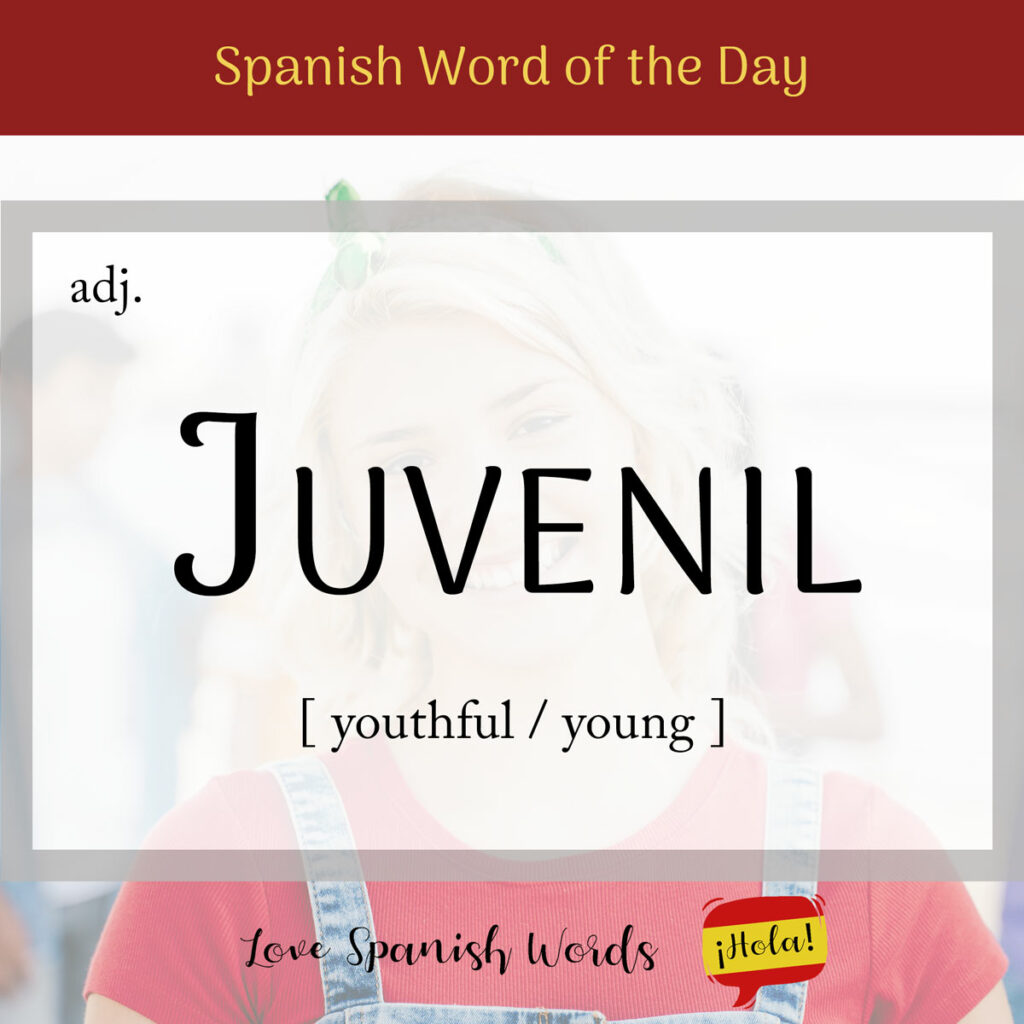The Spanish word juvenil comes from the Latin word juvenilis, which means youthful or youth. The word itself derives from the Latin word juvenis, which means young man or youth. Juvenil is used to describe someone who has physical or personality characteristics that are typical of young people. It is also used to describe anything related to youth.
Latin American Pronunciation
European Pronunciation

Juvenil is primarily used as an adjective to describe attributes or characteristics related to youth. As a noun, it refers to a group or category associated with youth, such as youthful sports groups.
El equipo juvenil ganó el campeonato.
The youth team won the championship.
When used literally, the word refers to anything about youth or adolescence. It applies to the physical or actual attributes of a young age group. Juvenil is used literally to talk about age, physical characteristics, and institutions or groups.
When applying the word to age, it can refer to a person in a youth category. For example, El es un deportista juvenil. (He is a youthful athlete.)
When discussing characteristics, this verb is used for physical or physiological traits like appearance and vitality. For instance, Mi abuela tiene piel juvenil means My grandmother has youthful skin, suggesting she looks young.
A third way to use the word juvenil literally is when describing groups, organizations, or institutions specifically designed for young people. For example, Mi hermano participa en un club de fútbol juvenil. (My brother participates in a youth soccer club.)

Fun Fact:
The English word juvenile is another translation for juvenil. However, in English, the word juvenile carries a negative connotation besides simply meaning young. Juvenile often refers to behaviours perceived as immature or childish, including bad or criminal behaviour.
In Spanish, juvenil carries a neutral or positive connotation about youth. It focuses on someone having positive youthful characteristics rather than negative ones. Therefore, when translating, using the English words young or youthful is a better option in most cases than the English word juvenile.
When used figuratively, juvenil describes behaviors or qualities associated with a person’s youth or something that captures the essence or spirit of youthfulness rather than actual age.
Some of those physical attributes or characteristics metaphorically attributed to youth are energy, optimism, enthusiasm, inexperience, strength, and idealism. These words imply having a sense of freshness or having a youthful mindset that goes beyond the literal age of the person. For example, the sentence below implies the aunt has energy despite her actual age:
Mi tía tiene un espíritu juvenil. Tiene mucha energía para todo.
My aunt has a youthful spirit. She has a lot of energy for everything.
Juvenil is used to describe metaphorical freshness and can be used to imply something feels fresh or energetic. It’s applied when something feels modern and generates excitement. For example, este vestido tiene un toque juvenil. (This dress has a youthful touch.)
Another figurative use is innovation related to youth. Juvenil describes something that feels modern, new, or innovative. La oficina tiene un diseño juvenil. (The office has a youthful design.) Here, the word conveys that the office has a youthful spirit, giving it a fresh or innovative vibe.
Below are some common word combinations that use the word juvenil:
- enfoque juvenil = youth approach
- diseño juvenil = youthful design
- estilo juvenil = youthful style
- cultura juvenil = youth culture
- toque juvenil = youthful touch
- deporte juvenil = youth sports
- club juvenil = youth club
- institución juvenil = youth institution
- espíritu juvenil = youthful spirit
- literatura juvenil = young adult literature
The Spanish word juventud (the youth) is a noun meaning youth and it is related to juvenil. It is applied in two ways. One way is when referring to a period of being young and the other is when referring to young people as a collective group.
En mi juventud, solía viajar por todo el mundo.
In my youth, I used to travel all over the world.
The word joven is both a noun and adjective that is used interchangeably with juvenil in some contexts. As a noun, it pertains to a young person. As an adjective, it’s used directly to describe someone as being young or as someone having youth, literally or metaphorically.
A pesar de ser mayor, mi abuela tiene una mentalidad joven.
Despite being older, my grandmother has a young mentality.

Spanish idioms featuring ‘juvenil‘
Tener un espíritu juvenil
Literal translation: to have a youthful spirit
English meaning: to have a youthful behaviour or mindset, or to convey a sense of vigour and vitality
Tener un toque juvenil
Literal translation: to have a youthful touch
English meaning: to have qualities or characteristics associated with youth, such as energy, freshness, modernity, innovation

